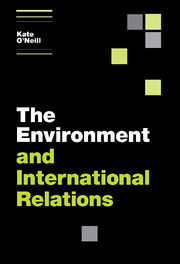Book contents
- Frontmatter
- Contents
- Preface
- Acknowledgements
- List of commonly used abbreviations
- 1 Introduction: The environment and international relations
- 2 International environmental problems
- 3 Actors in international environmental politics
- 4 State-led global environmental governance: International cooperation and regime formation
- 5 The impacts and effectiveness of environmental treaty regimes
- 6 Global economic governance and the environment
- 7 Non-state global environmental governance
- 8 Conclusions: The environment and international relations in the twenty-first century
- References
- Index
Preface
Published online by Cambridge University Press: 05 June 2012
- Frontmatter
- Contents
- Preface
- Acknowledgements
- List of commonly used abbreviations
- 1 Introduction: The environment and international relations
- 2 International environmental problems
- 3 Actors in international environmental politics
- 4 State-led global environmental governance: International cooperation and regime formation
- 5 The impacts and effectiveness of environmental treaty regimes
- 6 Global economic governance and the environment
- 7 Non-state global environmental governance
- 8 Conclusions: The environment and international relations in the twenty-first century
- References
- Index
Summary
Studying the global politics of the environment is a complex, sometimes challenging, but always illuminating, task. Those who study this area approach it from many different directions: political science, economics, sociology, law, and ecology, to name but a few. For my own part, I first heard about climate change from my high school biology teacher in the mid-1980s; shortly thereafter, we all found out about the ozone layer as all the hairsprays, deodorants and other aerosol products containing ozone-destroying chlorofluorocarbons (or CFCs) vanished from store shelves. As an undergraduate studying economics I learned about “externalities,” “public goods,” and other ways that unregulated capitalism leads, in the absence of intervention, to environmental damage – including damage that travels across national borders. I carried these interests on to graduate school and PhD work in political science, without really expecting to be able to study them in the context of an advanced degree in international relations theory. This all changed following the 1992 United Nations Conference on Environment and Development (UNCED), held in Rio de Janeiro. The Earth Summit, as it is often called, brought into focus a whole network of international treaties and agreements set up to manage international environmental problems – and proved to be a watershed moment for an emerging academic field of international environmental politics, particularly the study of international cooperation among nation states for global environmental protection.
- Type
- Chapter
- Information
- The Environment and International Relations , pp. ix - xPublisher: Cambridge University PressPrint publication year: 2009

